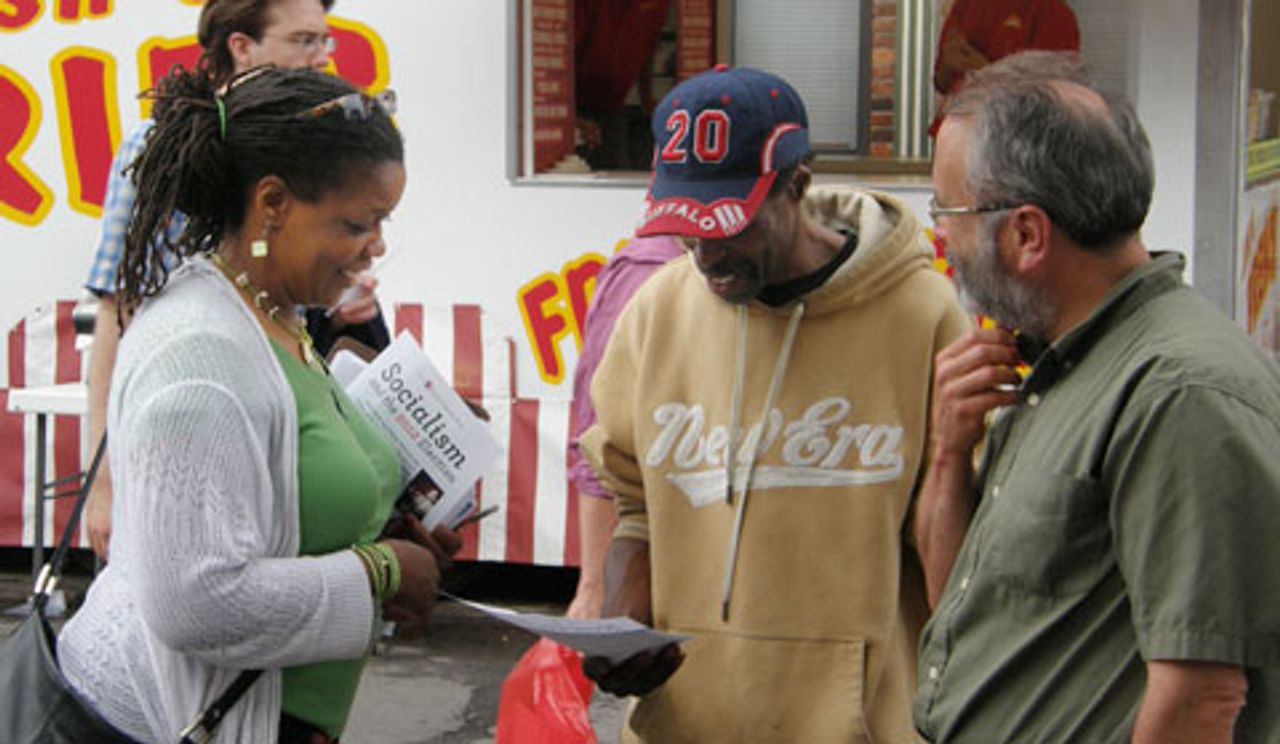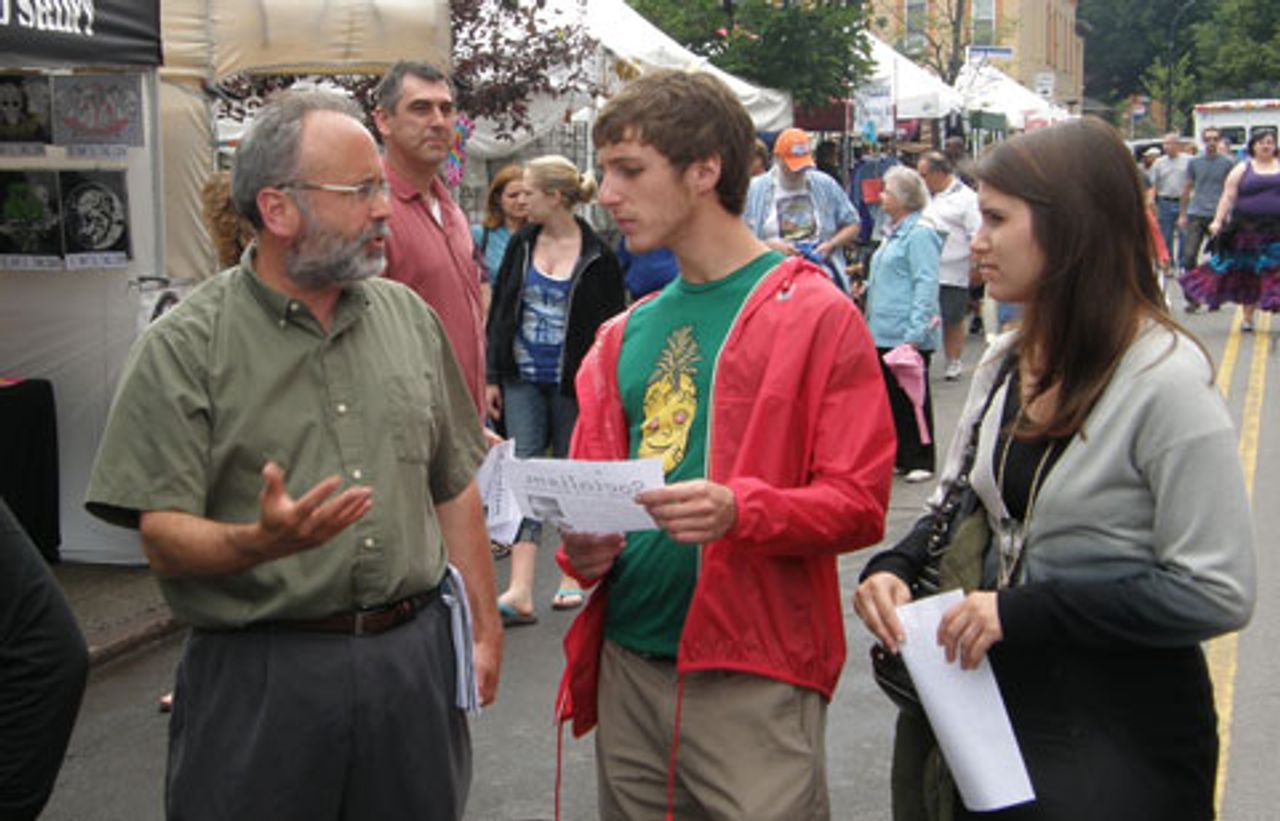A campaign team made up of SEP members and the party’s vice-presidential candidate, Phyllis Scherrer, won strong support from workers and young people in Buffalo, New York last weekend.
 Scherrer campaigning in Buffalo
Scherrer campaigning in BuffaloThe team set up an informational table at the annual arts festival, which draws thousands of people from throughout Buffalo and the surrounding western New York communities. Phyllis Scherrer was inundated with questions as person after person came up to find out about the campaign and learn what she stood for.
Katie McCarthy and Katy Rowe were among those who stopped to talk with Scherrer. Both are now living in Buffalo, but Katie comes from Syracuse, New York and Katie is from Texas. They are currently working for a non-profit organization and expressed concern about the destruction of the environment.
Katie explained that Texas was set to give an enormous tax break to Valero, a Texas oil firm that was largely involved in the Keystone pipeline deal. “They would have taken money directly away from education,” she said. Katy explained that the proposal was defeated, but “these politicians don’t care about education, they just care about their rich friends.”
Katie explained that there were even fewer jobs in Syracuse than in Buffalo. “The whole of upstate NY is hurting really bad. People need jobs, and jobs that they can live on.”
 A passerby shows interest in the SEP campaign material
A passerby shows interest in the SEP campaign materialBuffalo has been on a decline for 40 years as part of the deindustrialization of the American Midwest. Sitting on the eastern side of Lake Erie, and the western end of the Erie Canal, Buffalo had been an important steel and manufacturing center since the mid-19th century.
The steel mills and auto parts plants largely closed down over the past few decades. This has led to a long-term population decline and has left large tracts of the city with abandoned homes and vacant lots. Buffalo’s population has fallen by half—from 500,000 to 250,000—over the last three decades.
With the recession of 2008, Buffalo took a further hit, driving unemployment up and wages down. The official regional unemployment rate is over 8 percent, but is actually much higher if one includes the underemployed or those discouraged from seeking work. The percentage of Buffalo households in poverty or near poverty is 44 percent. Those with incomes below $15,000 stand at 27 percent (most include children); another 17 percent have incomes of $15,000 to $24,000 per year.
 Scherrer speaking to a worker
Scherrer speaking to a workerChris Phillips said things had to change, adding, “I definitely agree that the two-party system is a failure.” Scherrer explained that she was running because the working class needed its own party, based on an internationalist and socialist program. “I don’t want the ‘lesser of two evils,’” Chris said. “I don’t want to vote for evil. We need something that is for the working people.”
Chris said conditions for young workers remain very bad in the Buffalo area. “They say that the recession is over, but everyone I know is either out of a job or working for really low wages. People can’t make a living and they have no benefits.”
Don, a jobless young construction worker, said, “I have been unemployed for three years. I have worked a week here and a week there, but nothing steady. I have two young children and it is very hard when you can’t buy them things and take them places.
“Obama is no different than any of the politicians, they make lots of promises, but really nothing happens. They give all this money to the bankers, but there is no money for jobs, or education. There are things that need improved that would help the people; why don’t they spend money on that instead of just giving it to the rich?”
 An SEP campaigner speaks to young people
An SEP campaigner speaks to young peopleA lifelong Buffalo resident and an instructor at Head Start—the federally funded pre-school program—also spoke with Scherrer. Head Start is facing deep spending cuts by the Obama administration and it has increased costly education requirements for its instructors. In Buffalo, Community Action Organization of Erie County, Inc. administers the program.
“They are increasingly relying on inexperienced interns who serve one year without pay and three years at the minimum wage of $7.25 an hour,” she said. “In the US, with no raises for cost of living, that’s not a living wage. One quarter of the staff are unpaid interns.
“What kind of an education is that going to mean for the children?” She explained that budget cuts mean many children are not able to get into the program and that transportation is being cut so that others will not be able to find their way to Head Start centers. She also noted the lowering of the skills of instructors because the low pay is producing a higher turnover rate.
Like the rest of the country, public education is under attack in Buffalo with teachers being blamed for the lack of support for students. The Democratic administration of New York Governor Andrew Cuomo has just announced it will withhold $5.6 million in aid to six “low performing schools,” blackmailing the schools into firing the teachers in exchange for the extra aid.
Scherrer explained that public education is a basic right, which is being destroyed. “The Obama administration is slashing funds for education, while attacking teachers and parents. We need to transfer billions of dollars from the obscenely wealthy to the masses of people so that every child gets a good quality education.”
Doug, a young worker who stopped by table to talk with Scherrer, said, “This country needs a little revolution, don’t you think?”
He said the government should do more to keep jobs in the US and not let companies ship production overseas. In reply, Scherrer explained, “Multi-national corporations whose profits are only shared by a tiny elite have no borders or limitations, and moved those jobs to exploit low-wage workers internationally. It was not the fault of workers in China or any other part of the world that workers are out of work here. It is the fault of the capitalists’ insatiable drive for profits.”
She explained that the only way forward was not economic nationalism, which is the program of the trade unions, but the fight for the international unity of the working class to defend the right to a job and a decent standard of living for all workers. “This requires a fight for socialism,” she said, “which means the working class taking control of the industries and reorganizing production on the basis of a rational plan for the benefit of all.”
